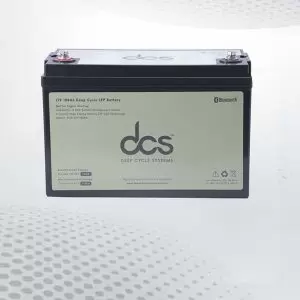Are you considering a LiFePO4 lithium battery for your energy needs? You’re not alone! With their rising popularity, these batteries are becoming the go-to choice for many applications—from solar power systems to electric vehicles. However, picking the right one can feel overwhelming with many options and specifications. Whether you’re looking to power an RV, set up an off-grid system, or need reliable energy storage at home, understanding how to choose the best Lifepo4 Lithium-Battery is crucial.
How to Determine the Right Size and Capacity for Your LiFePO4 Battery
Determining the right size and capacity for your Lifepo4 Lithium-Battery is essential to meet your energy needs. Start by calculating how much power you’ll require daily. Look at all devices you plan to use, their wattage, and how long you’ll run them daily.
Consider the battery’s voltage rating once you have a total watt-hour requirement. For example, if you’re looking at a 12V system and need 2400 watt-hours, you’d need a battery with a capacity of around 200Ah. This calculation ensures that your chosen battery can handle your energy demands efficiently.
Don’t forget about future expansion! If you plan on adding more devices or systems, it’s wise to choose a slightly larger capacity than initially calculated. This foresight helps avoid issues as your power requirements grow over time.
LiFePO4 vs. Other Lithium Batteries: Which one is Right for You?
When considering a Lifepo4 Lithium-Battery, it’s essential to understand how it compares with other types of lithium batteries. Lithium-ion and lithium polymer batteries are popular alternatives that offer high energy density but may lack stability. They can be more prone to thermal runaway, leading to safety concerns.
LiFePO4 batteries excel in terms of safety due to their stable chemistry. They have a lower risk of overheating and combustion, making them ideal for applications where reliability is crucial. Additionally, they provide excellent cycle life compared to other options.
However, if weight and compactness are your main priorities—like in certain electric vehicles or portable devices—you might consider traditional lithium-ion options despite their drawbacks. Assessing your specific needs will guide you toward choosing between these battery technologies.
The Benefits of Choosing a Lithium-Batteries for Your Energy Needs
Lithium-batteries, particularly LiFePO4 variants, offer numerous advantages for energy storage. They are known for their high energy density, which means you get more power in a smaller size than traditional lead-acid batteries. This compactness makes them ideal for various applications, from solar setups to electric vehicles.
Another significant benefit is their longer lifespan. Lithium-batteries can endure thousands of charge cycles without substantial degradation. This durability leads to lower replacement costs over time and less landfill waste.
Additionally, lithium technology provides faster charging times. With the ability to recharge quickly, users can enjoy an uninterrupted power supply while maximizing efficiency in both home and commercial settings. These attributes make lithium-batteries an excellent choice for diverse energy needs.
How to Choose the Right Voltage for Your Lifepo4 Lithium-Battery
Choosing the correct voltage for your Lifepo4 Lithium-Battery is essential for optimal performance. Start by assessing your device’s requirements; applications like solar power systems or electric vehicles often have specific voltage needs. Make sure to match the battery’s nominal voltage with your system’s.
For instance, most consumer electronics typically use 12V batteries, while larger setups might require 24V or even higher configurations. Ensure compatibility to avoid any damage and ensure efficiency.
Consider how many cells you plan to connect in series as well. Each cell provides about 3.2V when fully charged, so calculating the total will help you achieve the desired output voltage for your application without compromising safety or functionality.
Understanding the Importance of Cycle Life When Choosing a LiFePO4 Battery
Cycle life is a critical factor when selecting a LiFePO4 battery. It refers to the number of complete charge and discharge cycles the battery can undergo before its capacity significantly diminishes. A higher cycle life indicates the battery can last longer, providing reliable performance.
A long cycle life is essential for applications where regular charging and discharging are necessary—like electric vehicles or solar energy systems. This durability ensures efficiency and translates into cost savings in the long run, as you won’t need frequent replacements.
Additionally, understanding cycle life helps consumers gauge how well a battery will perform under various conditions. Different usage patterns may affect this aspect, making it crucial for users to match their needs with the right LiFePO4 solution. Consider cycle longevity alongside other features to make informed choices.
Choosing the Best LiFePO4 Battery for Solar Power Systems
When selecting a LiFePO4 battery for solar power systems, capacity is crucial. Determine your energy needs by calculating daily consumption and matching it with the battery’s amp-hour rating. A larger capacity allows for more extended usage during cloudy days or nights.
Next, consider your solar system’s voltage compatibility. Most setups use 12V, 24V, or 48V batteries. Choosing a battery that aligns with your inverter will ensure optimal performance and efficiency.
Keep an eye on cycle life and depth of discharge ratings. A higher cycle life means more charge-discharge cycles before replacement is needed. Opting for a battery with a more profound discharge capability maximizes usable energy without sacrificing longevity in your solar setup.
How to Assess the Charge and Discharge Rates of Lifepo4 Lithium Batteries
Assessing the charge and discharge rates of Lifepo4 Lithium Batteries is crucial for optimizing performance. Start by checking the battery specifications provided by the manufacturer. These specs often detail maximum charge and discharge rates, typically measured in amps. Understanding these values helps determine how quickly your battery can be charged or how much power it can deliver.
Next, consider your application needs. For example, if you’re powering an electric vehicle or a solar system, you’ll want a battery that supports higher discharge rates to ensure efficient energy usage during peak demand times.
Monitoring real-world performance is equally important. Use tools like amp-hour meters to track actual charging and discharging over time.
What You Need to Know About LiFePO4 Battery Safety Features before Buying
When considering a Lifepo4 Lithium-Battery, safety features should be at the forefront of your decision. These batteries often include built-in Battery Management Systems (BMS), which monitor voltage levels and temperatures to prevent overcharging or overheating. This technology significantly reduces risks associated with traditional batteries.
Additionally, look for protection against short circuits and reverse polarity. Such features ensure that the battery will remain safe and functional even if connections are mismanaged. Opting for a well-designed BMS can safeguard the battery and your connected devices.
Check for certifications from recognized safety standards organizations. Compliance with such regulations indicates thorough testing and adherence to safety protocols, giving you peace of mind as you utilize your Lifepo4 Lithium-Battery in various applications.
Selecting the Right LiFePO4 Battery for Off-Grid Living and RV Use
A reliable power source is essential When living off-grid or travelling in an RV. LiFePO4 batteries are ideal for these scenarios due to their stability and longevity. They can easily handle solar panels’ or generators’ constant charge cycles, ensuring you have power whenever needed.
Consider your energy needs when selecting the proper battery size and capacity. Calculate how much power you’ll consume daily from appliances, lights, and devices. This will help determine the total amp hours required to keep everything running smoothly without frequent recharges.
Don’t forget about weight and space limitations in your setup. A lighter battery allows more accessible transport in RVs while maximizing available storage space for other essentials.
How to Match Your LiFePO4 Battery to Your Power Requirements
Understanding your power requirements is crucial when selecting a Lifepo4 Lithium-Battery. Begin by calculating the total watt-hours you need for your devices or systems. Make a list of everything that will draw power, from lights to appliances, and estimate how long each item will be used daily.
Once you’ve determined your watt-hour needs, consider the voltage compatibility of your battery with your application. Standard configurations are 12V, 24V, and 48V setups. Ensure that the chosen battery matches these specifications to avoid performance issues.
Factor in peak demand. Some devices require higher energy bursts upon startup. Choose a LiFePO4 battery that can handle these spikes without compromising its lifespan or efficiency.
Factors Influencing the Price of Lithium Battery and How to Get the Best Value
Several factors can influence the price of a Lithium Battery. First, the quality of materials used plays a significant role. High-purity lithium and advanced manufacturing techniques often come at a premium but lead to better performance and longevity.
Market demand also impacts pricing. Increasing competition for high-quality batteries can drive costs as more industries shift towards renewable energy solutions. This demand affects not just retail prices but availability as well.
To get the best value, research before purchasing. Compare brands and specifications while reading customer reviews to gauge reliability.
Choosing a LiFePO4 Battery for Electric Vehicles: What to Consider
Consider the energy density when selecting a Lifepo4 Lithium-Battery for electric vehicles. A higher energy density means more power stored in a compact size, which is critical for maximizing range without adding excessive weight.
Next, evaluate the battery’s discharge rate. This affects performance during acceleration and hill climbing. A battery with an optimal discharge rate ensures your vehicle performs well under various conditions.
Think about thermal management features. LiFePO4 batteries operate best within specific temperature ranges.
How Temperature and Environment Affect LiFePO4 Battery Performance
Temperature plays a crucial role in the performance of LiFePO4 batteries. High temperatures can increase the risk of overheating, which may lead to reduced lifespan and efficiency. Excessive heat accelerates chemical reactions within the battery, potentially causing damage or even failure.
Conversely, cold environments also pose challenges for these batteries. When exposed to low temperatures, LiFePO4 cells experience decreased capacity and slower charge rates. In extreme cold conditions, you might find that your battery struggles to deliver power effectively when needed most.
Humidity is another environmental factor worth considering. If the battery casing is not correctly sealed, high moisture levels can cause corrosion.
Conclusion
Choosing the correct Lifepo4 Lithium Battery is crucial for maximizing performance and longevity. Understanding your specific needs shapes every decision, from capacity to voltage, ensuring you get a battery well-suited to your applications. The landscape of lithium-batteries offers various options, but selecting one with the right features will enhance efficiency and safety. Factors like charge rates, cycle life, and environmental conditions all play significant roles in how effectively your battery performs.
FAQs
What is the lifespan of a LiFePO4 lithium battery?
Lifepo4 Lithium Battery typically offer impressive cycle life, often exceeding 2,000 cycles at full depth of discharge. This longevity makes them an excellent investment for various applications.
Can I use my LiFePO4 battery in extreme temperatures?
Yes, but it’s vital to understand how temperature affects performance. While these batteries function well in moderate conditions, extreme heat or cold can impact efficiency and lifespan.
How do I maintain my Lifepo4 Lithium-Battery?
Proper maintenance involves regularly monitoring charge levels and avoiding complete discharges whenever possible. Keeping your battery clean and ensuring adequate ventilation will also extend its life.
| Related Business Listings |
| Contact Directory |
| Local Business Profiles |




